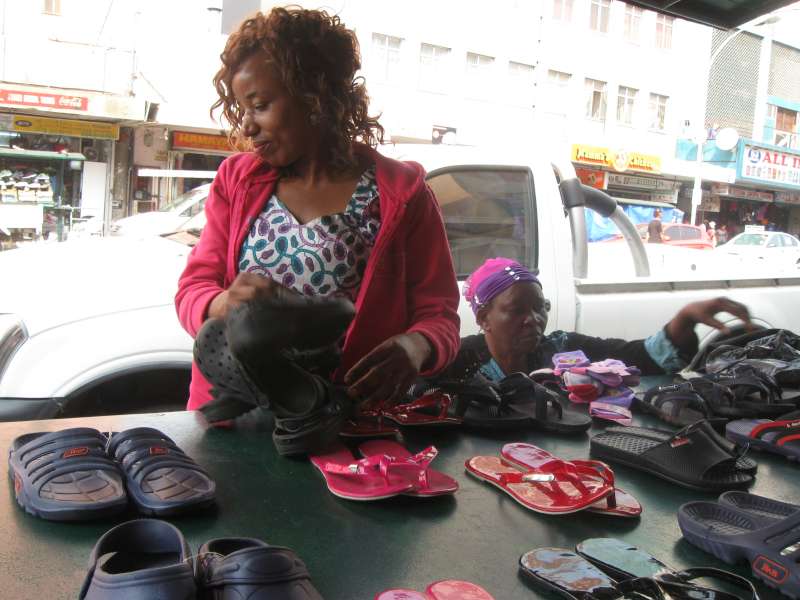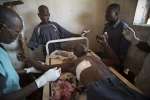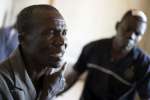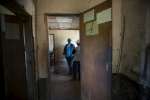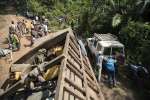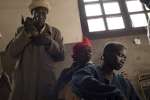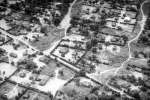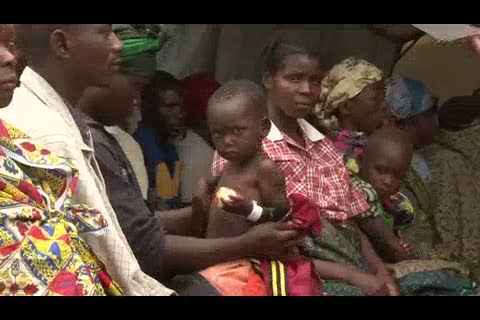Attacks on foreigners in South Africa expose refugee women to new dangers
News Stories, 20 October 2015
DURBAN, South Africa, Oct 20 (UNHCR) – When Congolese refugee Faiza Lugi saw the mob toting machetes and heavy knobkerrie sticks surge down the main street in this port city chanting anti-foreigner slogans, she knew that it was time to run again.
Having fled war, gang rape and chaos in the Democratic Republic of Congo (DRC) more than a decade ago, she abandoned her roadside stall selling footwear in Durban and ran from the rabble as it looted businesses, torched homes and killed at least seven people.
"I was totally shocked," says Lugi, who sought refuge at a satellite police station in the city where hundreds of terrified foreigners had gathered, then ran to find a friend who was preparing to flee to a shelter for displaced foreign nationals in nearby Isipingo which had been set up weeks earlier. He urged her to come too.
As she boarded a mini-bus taxi to Isipingo, a town 20 kilometres from Durban, Lugi thought of her Congolese mother and 18-year-old daughter, Lydia Neema who was still in school in the city.
"I was terrified for them but I couldn't fetch them!" she says. "I wouldn't make it there alive because I look foreign and my grasp of Zulu, the local language is very poor. My consolation was that my daughter is fluent in the language so she wouldn't be targeted. My mother joined me a few days later because she was vulnerable on her own."
Lugi's daughter remained in Mayville, a suburb outside Durban, throughout the weeks of violence. Her grasp of Zulu had for the most part guaranteed her safety. "None of my friends know that I'm actually Congolese," she confides. "If they did, they would probably desert or harass me, so I've never told them."
It was the second time that deadly violence had overtaken the family and thrown their lives into chaos. More than a decade earlier Lugi took flight from Uvira in eastern DRC after rebels gang raped her sister in law as she hid under the bed, her hand clamped tightly over the mouth of her then six-year-old daughter to prevent her screaming.
Piling into a truck during a break in the fighting, they joined the 315,000 people escaping regional conflicts in Africa who are seeking refuge and asylum in South Africa. They were subsequently joined by Josephine, Lugi's 66-year-old mother, who is among 23,500 asylum seekers and refugees from DRC.
The xenophobic attacks came amid a downturn in the South African economy that led to the scapegoating of foreigners, among them hundreds of already highly vulnerable refugees like Lugi. Following the government's efforts to quell the violence, and a UNHCR initiative to help refugees reintegrate into their adoptive society with financial assistance, Lugi and her mother went back to their rented quarters in Mayville – although their return was short lived.
During their absence their room had caught alight and everything in it burnt to ashes in what Lugi believes was an act of sabotage. "I was devastated," she says. "Years of hard work had burnt to the ground."
"People didn't want us there, and by that time, I had already used up most of the money I had received from UNHCR to pay the rent."
Worried about where she and her family would spend the night, Lugi turned to Refugee Social Services – UNHCR's South African partner – for help. Through a UNHCR funded emergency programme, Lugi and her family relocated to a block of flats in Durban's central business district where she has been assisted with rental payments, second hand clothing, a queen sized mattress, food vouchers and other sundries.
The emergency programme provides assistance for a three month period an August was the last month that they would receive help.
Despite also being the recipient of UNHCR's business re-start assistance – a means of assisting identified refugees who lost their livelihoods as a result of the xenophobic violence start over again – Lugi's small business selling shoes is struggling.
What looms large in her mind is the rent that was due in October. "I just don't know what to do anymore," she admits. "My mind plays my problems over and over again and I don't know how to fix them."
"What we're seeing," says Yasmin Rajah, RSS's Director, "is an increase in the number of refugees returning to our offices regularly for additional assistance. Unfortunately, with our limited resources we can only do so much and ultimately, refugees have to make the best of a bad situation. It is worrying."
For UNHCR, keeping a close eye on refugee women like Lugi is priority.
"We know that refugee women are generally at risk," says Anna Leer, UNHCR Senior Regional Community Services Officer, "however conditions resulting from the xenophobic violence can leave destitute refugee women at increased risk of abuse and exploitation where they may be forced to resort to survival sex or other destructive coping mechanisms."
Whereas funds are limited and self-sufficiency is the only way forward, UNHCR and partners do what they are able to prevent this by providing temporary assistance coupled with realistic self-reliance plans.
In spite of her problems, Lugi is grateful that the South African government has granted her mother an old age pension which she receives monthly. Similarly, her medication and hospital visits are covered. RSS is looking into assisting her daughter with the financial means to travel to school. They are also helping her engage her daughter's school to waive the fees she owes but cannot afford.
"From being self-sufficient," she says with tears in her eyes, "I have become indigent and disillusioned. I just don't know where to turn anymore."
Pumla Rulashe Durban, South Africa




